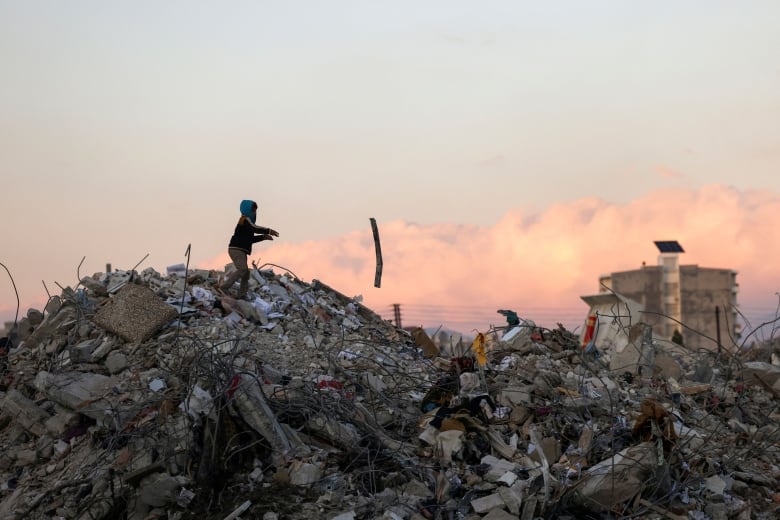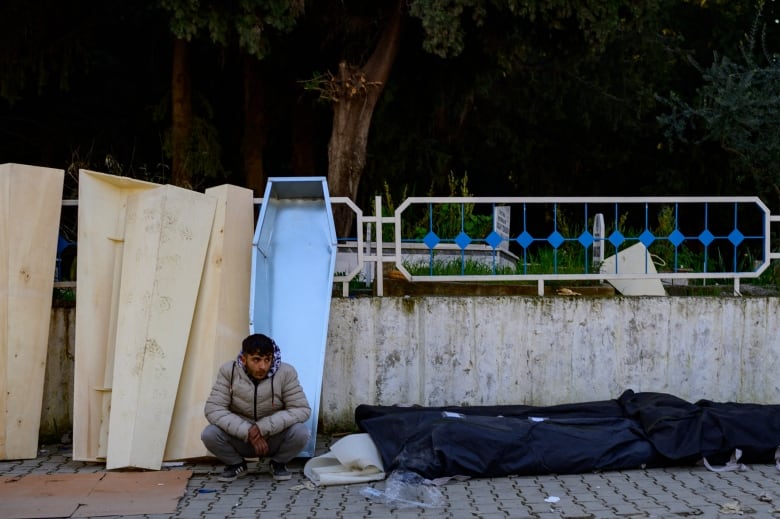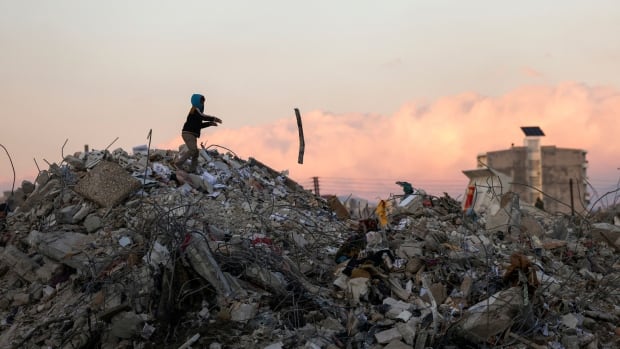Rescue teams in Turkey on Saturday pulled to safety a family of five who survived inside their collapsed home for five days following a major earthquake in a sprawling border region of Turkey and Syria. The death toll, however, was approaching 25,000.
They first extricated mother and daughter Havva and Fatmagul Aslan from among a mound of debris in the hard-hit town of Nurdagi, in Gaziantep province, HaberTurk reported. The teams later reached the father, Hasan Aslan, but he insisted that his other daughter, Zeynep, and son Saltik Bugra be saved first.
Then, as the father was brought out, rescuers cheered and chanted “God is Great!”
Two hours later, a three-year-old girl and her father were pulled from debris in the town of Islahiye, also in Gaziantep province, and an hour after that a seven-year-old girl was rescued in the province of Hatay, nearly 132 hours after the quake. The rescues bring to 12 the number of people rescued Saturday, despite diminishing hopes amid freezing temperatures.
“What day is it?” 16-year-old Kamil Can Agas asked his rescuers after he was pulled out of the rubble in Kahramanmaras, according to NTV television.
Shimmers of hope
Members of the mixed Turkish and Kyrgyz search teams embraced each other, as did the teenager’s cousins, with one of them calling out: “He is out, brother. He is out. He is here.”
The rescues brought shimmers of joy amid overwhelming devastation days after Monday’s 7.8-magnitude quake collapsed thousands of buildings, killing more than 24,500 people, injuring another 80,000 and leaving millions homeless. Another quake nearly equal in power and likely triggered by the first caused more destruction hours later.
Not everything ended so well, however. Rescuers reached a 13-year-old girl inside the debris of a collapsed building in Hatay province early on Saturday and intubated her. But she died before the medical teams could amputate a limb and free her from the rubble, Hurriyet newspaper reported.
Even though experts say trapped people can live for a week or more, the odds of finding more survivors were quickly waning. Rescuers were shifting to thermal cameras to help identify life amid the rubble, a sign of the weakness of any remaining survivors.
The CBC’s Briar Stewart and Chris Brown take us to the front lines of the rescue efforts in Turkey to talk about the next steps in the mission and what support could come from Canada.
As aid continued to arrive, a 99-member group from the Indian Army’s medical assistance team began treating the injured in a temporary field hospital in the southern city of Iskenderun, where a main hospital was demolished.
One man, Sukru Canbulat, was brought into the hospital in a wheelchair, his left leg badly injured with deep bruising, contusions and lacerations.
Wincing in pain, he said he had been rescued from his collapsed apartment building in the nearby city of Antakya within hours of the quake on Monday. But after receiving basic first aid, he was released without getting proper treatment for his injuries.
“I buried [everyone that I lost], then I came here,” Canbulat said, counting his dead relatives: “My daughter is dead, my sibling died, my aunt and her daughter died, and the wife of her son” who was 8 1/2 months pregnant.

A large makeshift graveyard was under construction on the outskirts of Antakya on Saturday. Backhoes and bulldozers dug pits in the field on the northeastern edge of the city as trucks and ambulances loaded with black body bags arrived continuously. Soldiers directing traffic on the busy adjacent road warned motorists not to take photographs.
The hundreds of graves, spaced no more than one metre apart, were marked with simple wooden planks set vertically in the ground.
Makeshift graveyard
A worker with Turkey’s Ministry of Religious Affairs, who did not wish to be identified because of orders not to share information with the media, said that about 800 bodies were brought the cemetery on Friday, its first day of operation. By midday on Saturday, he said, as many as 2,000 had been buried.
“People who are coming out from the rubble now, it’s a miracle if they survive. Most of the people that come out now are dead, and they come here,” he said.
Temperatures remained below freezing across the large region, and many people have no shelter. The Turkish government has distributed millions of hot meals, as well as tents and blankets, but is still struggling to reach many people in need.

Turkish President Recep Tayyip Erdogan, visiting quake-stricken Diyarbakir, said universities would switch to long-distance education until the summer, to free up state-run dormitories for survivors left homeless.
In the city of Kahramanmaras, where a stadium was turned into a makeshift camp, survivors walked among hundreds of tents, queued for hot meals and huddled around campfires.
In Antakya, an international charity helping Syrian refugees in Turkey has offered shelter to dozens in the grounds of an intact building on the city’s edge.
“The problem is there is not a single home that is inhabitable in Antakya, so the only shelter is the street,” said Ahmed Abou el-Shaar, founder of the Molham charity.
The disaster compounded suffering in a region beset by Syria’s 12-year civil war, which has displaced millions of people within the country and left them dependent on aid. The fighting sent millions more to seek refuge in Turkey.
More than 5 million left homeless
The conflict has isolated many areas of Syria and complicated efforts to get aid in. The United Nations said the first earthquake-related aid convoy crossed from Turkey into northwestern Syria on Friday, the day after an aid shipment planned before the disaster arrived.
The UN refugee agency estimated that as many as 5.3 million people have been left homeless in Syria.
President Bashar al-Assad and his wife have visited injured quake victims in a hospital in the coastal city of Latakia, a base of support for the Syrian leader.
Syrian state TV said Assad and his wife, Asma, on Saturday morning visited Duha Nurallah, 60, and her son, Ibrahim Zakariya, 22, who were pulled out of rubble the night before in the nearby coastal town of Jableh.
The head of the World Health Organization, Tedros Adhanom Ghebreyesus, arrived in Syria’s northern city of Aleppo on Saturday, bringing with him 35 tons of medical equipment, state news agency SANA reported. He said another plane carrying an additional 30 tons of medical equipment will arrive in the coming days.
The opposition Syrian Civil Defence, also known as White Helmets, said Saturday that it “is almost impossible to find people alive.”
The total death toll in Syria’s northwestern rebel-held region has reached 2,166, many of them women and children. The total dead in Syria was 3,533, while in Turkey, officials counted 21,043 dead through Saturday.


